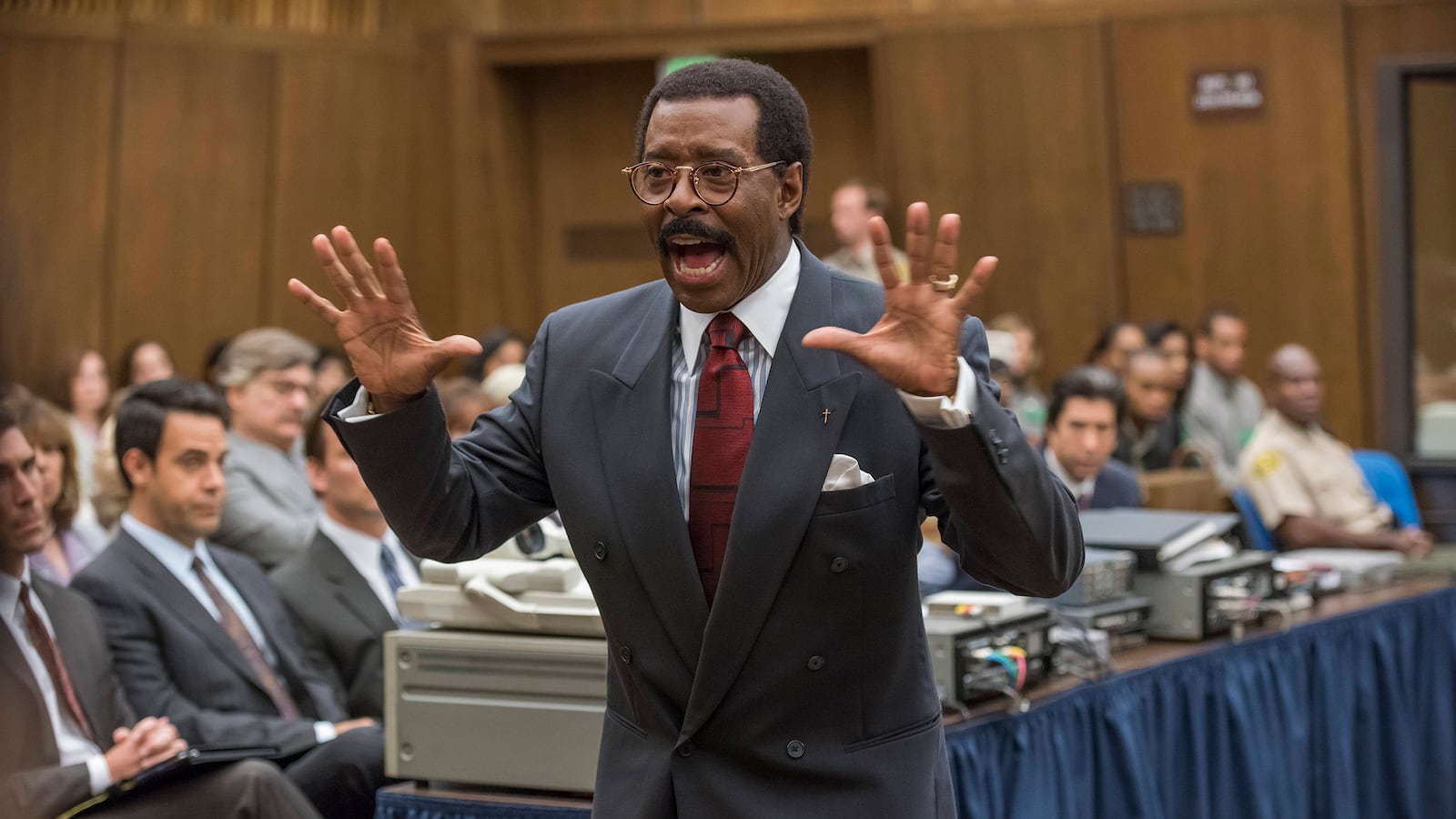So did he do it?
That’s a joke, folks. How odd that series can be this captivating when the ending was already so well-known. (History: the ultimate spoiler alert.)
It’s how we got to that verdict that was so captivating, that turned “the run of his life” into the TV run of the year thus far. It took a decidedly of-its-time media circus and cultural moment that was renewed in relevance and resonance, in disturbing and eye-opening ways.
And, after Tuesday night, The People vs. O.J. Simpson: American Crime Story is over. He’s still, officially, not guilty. But who knew we’d still care?
The series, through 10 scorching must-see episodes, re-dramatized a case and historical phenomenon we thought we knew every single exhaustive detail about through a lens that refocused the roles of race, class, and sexism in its outcome.
It made human the people we had turned into caricatures in real life, and chastised us for our reflex to, decades later, still do that very thing. Viewed in hindsight, it’s a 10-episode money shot showing us exactly when we as a culture consummated with headline- and ratings-horny media, conceiving an entire generation of fame-mongers and reality TV stars.
In its most effective moments—the Marcia Clark-centric episode, the glimpse at the jurors, the dismantling of Mark Fuhrman—it felt like this trial was happening again today. Race, celebrity, sexism, police corruption, the power of media and the even greater power of cultural discontent: Any of this sound familiar?
And going into the finale, the biggest question for me was who was going to get the last moment? Whose voice in that debate were we going to be left with?
Was it going to be O.J. Simpson, the title star and figurehead lightning rod for all of these conversations? Was it going to be Marcia Clark, perhaps as close to any protagonist as we’re given in this series?
Perhaps Johnnie Cochran and a last message on the necessity to reexamine our feelings about race in this country would get the last moment. Or would there instead be a winking image referencing the media’s continued influence on our lives?
In a classy move, The People vs. O.J. Simpson gave the last word to the ones who, maddeningly, were voiceless throughout the entire spectacle of the trial: Nicole Brown Simpson and Ron Goldman.
The episode mined undue tension from the wait for the most well-known verdict in history before exploring how those two words—“not guilty”—immediately affected the players involved, finishing with a “Where are they now?” montage that ended, chillingly, with the photos of Brown Simpson and Goldman.
In a way, it was the last salvo in the power of this series, constantly reminding us of the ways the major issues of the trial are relevant today. So often during the three-ring circus of the Simpson trial, the victims were forgotten. That last image was the best examples of why these conversations the case sparked are so important: Real lives are at the heart of them.
Even today, when we talk about police corruption, race relations, hashtags that become movements, and cultural conversations that are galvanizing the country, we can often forget the reason for all of it and what started it all: the loss of lives.
Of course, American Crime Story is also a TV show. And a very good, entertaining one—one that produced a phenomenal finale.
We have Marcia Clark going through all the evidence of the trial again. Dear god, all the evidence. We have O.J. Simpson crying while Chris Darden gives his closing arguments, all cleverly intercut with the grainy courtroom feed we all watched two decades ago. And we have Johnnie Cochran uttering his infamous refrain: “If it doesn’t fit, you must acquit…”
Sarah Paulson as Marcia Clark squaring off against Courtney B. Vance as Johnnie Cochran is the Batman vs. Superman superhero match-up we all wish Marvel had given us. (Whether any justice dawned from it, however, is a matter of contention.)
As for Marcia Clark and Sterling K. Brown’s Chris Darden? Consider them the love story of the year: a fiery, passionate friendship (and maybe more) that was rooted in that thing the best relationships always are: mutual respect.
These closing arguments were acting tour de forces from three of the best performers in television this year, but more captivating was the footage that took us into their offices and homes as the prepped for those speeches we all watched happen live.
Most entertaining was the look at Cochran drafting that famous line in his office. “If the glove’s too small, easy call,” he brainstorms before arriving at the stroke of brilliance.
The show delicately finds humor in a high-profile murder trial without ever betraying the gravity of the task at hand—in fact, it takes it more seriously than perhaps the media did two decades ago—or letting campiness turn the victims into footnotes, the way they were during the trial’s spectacle.
The whole series, while hardly subtle in its hurling of themes at the audience, was a remarkable balancing act in nuance, thwarting viewer expectations of how they might watch a series about this trial.
A defense team is depicted devising a strategy to bury facts, distract jury from evidence, and possibly get a murderer off, without coming off as nefarious villains from a cartoon, the same way Marcia Clark and Chris Darden aren’t flying into the courtroom every day in their hero’s spandex to fight the good fight.
Every blunder was shocking. Every misstep was maddening. Every time passion overtook reason it was at once thrilling and nauseating, making this series a triumph in historical reimagining.
Certainly, the borderline unfathomable “can’t make this shit up” twists and bizarre developments that became near-daily occurrences in the real Simpson case laid the groundwork for the show’s towering dramatic accomplishments. But there’s an art in storytelling when O.J. Simpson is found not guilty and you’re roused by it all over again.
Yet it’s in showing what happened after the verdict is read that American Crime Story is more revelatory.
Robert Kardashian is shell-shocked. He runs to the bathroom to vomit. “Twenty years in public service and I feel like my headstone will say, ‘He lost O.J.’” says D.A. Gil Garcetti.
Marcia Clark cries, “I’m so ashamed” for botching an “airtight case,” while Chris Darden watches, a single tear dripping down his cheek. Later, she explains why she is such a passionate prosecutor: She was raped when she was 17. “I have something, this thing in me that wants vengeance, vengeance for victims,” she says. She thought the jury felt the same. “I never doubted that. Until now.”
Johnnie Cochran confronts Darden in the hallway, telling him, “When the dust settles, I’d like to bring you back into the community,” prompting one of the best bits of writing in the show: “O.J. is the first black defendant in history to get off because he’s black…this is some civil rights milestone. Police in this country will keep arresting us, keep beating us, keep killing us. You haven’t changed anything for black people here. Unless, of course, you’re a famous rich one in Brentwood.”
And Cochran gets to look at the TV and see Bill Clinton talking about how this case should affect the way our country deals with race. “You got the president,” his colleague whispers in amazement as Cochran’s eyes well up. “That’s the victory,” he says. “Our story is out of the shadows.”
These scenes in sequence encompass what makes The People vs. O.J. Simpson so surprising. It, for once, made this trial about people.
The last person that we follow, before that montage leading us to the photos of Ron and Nicole, is Simpson himself.
He brags about how Star magazine is paying $400,000 for exclusive rights to photos of his celebration party. He’s miffed when protesters line the streets of Brentwood, expecting revelers instead. He stares out the window. He breaks down and cries. The wheels turn concernedly when he can’t get a restaurant reservation because of who he is now.
He never lets us know whether he did it.
That’s on purpose, of course. The point of this series was never to tell us whether Simpson was guilty, in the same way that, as Clark always suspected, whether he murdered Ron and Nicole became irrelevant to the case itself.
The last time we see Simpson, he is staring at a statue of himself while cheers of his football glory days fade into the melancholy “Ain’t No Sunshine.”
He contemplates his legacy. We just watched it.






